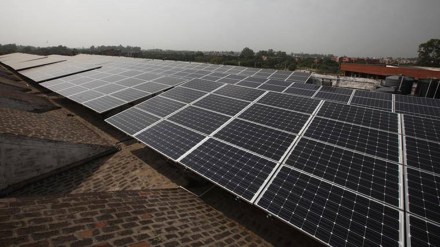– By Asif Khan
Solar energy has the potential to play a significant role in the country’s endeavour to bring in a swift transition towards clean energy; thereby creating a sustainable ecosystem which protects the environment, enhances energy security, creates jobs, and fosters economic growth. The government has set an ambitious target of adding 250 GW of renewable energy in the next five years and installing 500 GW of clean energy by 2030; for which solar energy can be a key driver. To catapult the energy transition, players across the industry have been leveraging government policies and technological innovations to increase domestic production and help the country become self-reliant.
While solar power has gained significant popularity and is considered a viable source of renewable energy, several barriers can hinder its installation and widespread adoption. Primarily, the upfront costs associated with installing solar panels can be a significant barrier. While the prices of solar panels have decreased over the years, the initial investment can still be substantial for residential, commercial, or industrial installations. Access to financing options for solar installations can be challenging, especially for individuals or organizations with limited financial resources. The lack of affordable loans or lease options can make it difficult for many to afford the upfront costs.
Integrating solar power into existing electrical grids can also be challenging. In some cases, outdated grid infrastructure may not be able to handle the influx of solar power, leading to technical and logistical difficulties. Upgrading or expanding the grid infrastructure to accommodate solar power can be costly and time-consuming. Another major factor hindering a faster adoption of solar power can be the lack of public awareness and education on solar energy. Limited knowledge and awareness about solar power and its benefits can be a barrier to its installation. Many individuals and organizations may not be familiar with the potential savings, environmental benefits, and technological advancements associated with solar energy.
Moreover, solar power is an intermittent energy source, dependent on sunlight availability. The lack of efficient and cost-effective energy storage solutions can limit the ability to store excess energy for use during cloudy periods or at night. In some cases, concerns about grid reliability and stability when relying heavily on solar power can deter installations.
However, efforts are underway to address these barriers and promote the widespread adoption of solar power. Central and state governments are implementing simplified and standardized permitting procedures for solar installations. This includes reducing paperwork, expediting the approval process, and providing clear guidelines for installers and homeowners. One of the key initiatives taken by the government includes the Jawaharlal Nehru National Solar Mission (JNNSM) which was launched in 2010. The program aims to promote the deployment of solar power and make it competitive with conventional sources of energy. It offers various incentives such as subsidies, tax benefits, and viability gap funding to attract investment in solar projects.
There has also been the implementation of net metering policies, which allow solar panel owners to sell excess electricity back to the grid. Net metering ensures that solar system owners receive fair compensation for the electricity they generate, making solar installations more economically viable. Players in the industry now have easy access to low-interest loans and financing options specifically designed for solar installations. This can help overcome the financial barrier for individuals and businesses without upfront capital to invest in solar power.
There should be increased public awareness and education about the benefits of solar power. This includes disseminating information about the cost savings, environmental benefits, and long-term advantages of solar energy. Education campaigns can help dispel myths and misconceptions about solar power and encourage more widespread adoption. Investing in training programs and workforce development initiatives to create a skilled workforce for the solar industry can also be a significant step. This ensures there are enough qualified professionals to handle the growing demand for solar installations.
(Asif Khan is the Director of solar division at Servokon.)
Disclaimer: Views expressed are personal and do not reflect the official position or policy of Financial Express Online. Reproducing this content without permission is prohibited.
